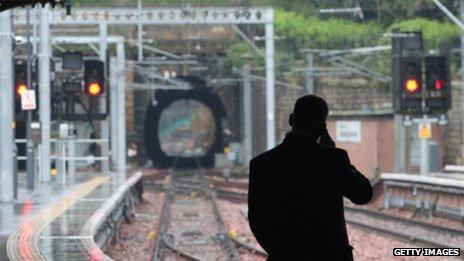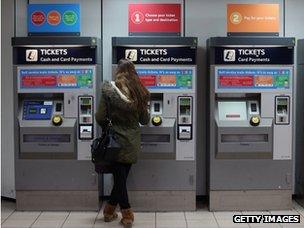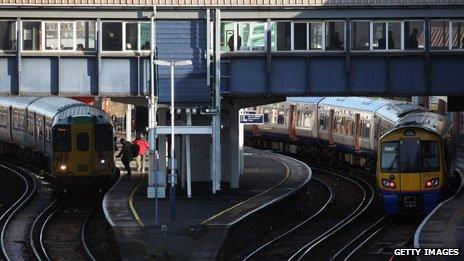Searching for the most expensive train journey
- Published
- comments

Rail fares have gone up again, leading to claims that Britain has the most expensive trains in Europe, if not the world. So what is Britain's most expensive stretch of railway?
You shell out thousands of pounds a year in exchange for half an hour standing with your face hidden behind the Daily Telegraph - or a copy of Metro - an elbow in the back, and from the public address system comes a series of garbled announcements about "the late running of this service".
Such is the caricatured experience of the commuter on Britain's expensive and overcrowded railways.
The arrival in January 2012 of a 6% hike in rail fares brought a mixture of weary resignation and anger from passengers. Season tickets to London from Stevenage reached £3,200, Leeds to Sheffield £2,148, and Manchester to Liverpool £2,688. Swansea to Cardiff is now £1,468 and Glasgow to Edinburgh is £3,380.
Recent research by the Campaign for Better Transport suggested that season tickets for commuters around London cost more than three times those of their Spanish and German equivalents, and 10 times more than those in Italy.
Much of the anger seems to be focused in England, particularly in the South East and London. In Scotland, ticket prices tend generally to be lower, reflecting higher subsidies.

The new year has brought price hikes
One of the most pricey routes in England is St Albans to London, where the season ticket of £2,988 works out at 31p a mile, or £10.60 for a single ticket at 52p a mile.
Sandy Walkington, the Liberal Democrat parliamentary candidate for St Albans in 2010, calculated in 2009 that the town had the most expensive commuter route in the country. With fares rising more or less uniformly since then, and British tickets the highest in Europe, he says that St Albans-London is now the most expensive commuter route in Europe.
But St Albans isn't the highest priced journey in the country. When the railways were privatised in 1995, commuter routes at peak times were capped by government, unlike their long distance equivalents.
So what is the country's most expensive stretch of railway? The obvious answer is the Heathrow Express, which clocks in at a rate of £1.17 a mile. But this is a one-off route used mainly by business travellers.
To search for the most expensive journey is to plunge into a blizzard of complexity and opaque terms and conditions. The Association of Train Operating Companies (Atoc) says it operates services between 2,500 stations so cannot break them all down on a cost per mile basis.
Once upon a time, it would have been simple. Up until 1968 British Rail used a rigid price formula of 3.25d per mile (1.35p in decimal money).
Adjusted for inflation it works out at about 20 pence per mile. Perhaps surprisingly the average cost per mile today across the whole of the network is indeed about 20p. Railway expert Barry Doe says that in practice little changed until privatisation, at which point prices quickly diverged between the cheaper and more expensive routes.
The disparity between different rates per mile is bewildering across the country whatever the ticket type. An off peak fare from Kettering to London works out at 57 pence a mile, London to Manchester 40 pence, and Exeter to Penzance just 14p.
And for peak fares - known as Anytime tickets - some fares are close to reaching a pound a mile. Take a train at peak time from London to Manchester and the customer is charged £148 or 80 pence a mile.
Atoc is quick to point out that only 2% of people - mainly business travellers - use Anytime tickets.
But that fails to take account of the people sitting in stations up and down the country until peak time ends and they can use a cheap ticket.
"At the time of privatisation it was felt that the market would regulate peak time fares on the long distance journeys," Doe says.
That didn't work because rather than costs falling they rose under the new franchises, who also put prices up disproportionately on the long distance Anytime ticket.
Don't be misled by the headlines though, says Mark Smith, who used to set fares at the Department of Transport and now runs the website The Man in Seat 61. Britain has opted for an airline-style pricing structure, which means it has the widest range of train ticket prices in the world.
So a return ticket from London to Manchester varies from £296 to £24 depending on how flexible you are willing to be about when you travel.
"We've got the most aggressively expensive and the most aggressively cheap tickets. And more people have benefited from the cheap fares than have disbenefited from the expensive tickets," Smith says.
And while Virgin is often cited as the most expensive operator in the country Smith says that the average price paid for a ticket on the West Coast line has actually fallen in the last decade due to the range of discounts available.
Meanwhile, Atoc argues that rising passenger numbers reflect more frequent and better services with a "decent range of value for money tickets". Last year there were 1.4 billion journeys by rail - the highest number since the 1920s, when the rail network was around twice the size it is now.
And it's harsh to blame operators for the price of commuter routes, which are largely determined by the level of subsidy, says Smith.
"In Britain we've traditionally chosen a lower subsidy and lower income tax. The money has got to come from somewhere." In other words, the commuter - often living in more prosperous parts of the country - foots more of the bill but pays less income tax than their counterparts in Europe.

But railway fares are not just about money. Most people will have heard stories of the complexity, absurd anomalies and illogical rules that go with train tickets. There's the man who was fined £155 for getting off his train one stop early and thus breaching the terms of his advance ticket.
And legend has it that a commuter from Leighton Buzzard used to alight at Watford, run along the platform, down the stairs, touch in with his oyster card - which provides cheap travel on London transport - before sprinting back and clambering back on board the train.
So confusing is the system that even the train operators occasionally display the wrong information. The website of First Capital Connect advertises an off peak single from St Albans to London as being more expensive than the Anytime ticket.
And booking a triangular journey is not easy. If you enter London to Liverpool, returning via Leeds, into the Trainline's website, you are greeted with the response: "No tickets are available, please refine your search".
Customers who do manage to book these kind of journeys have usually been clever with advance tickets. Buying even off-peak tickets can be expensive.
"Don't look for logic in the fares structure," says Mike Hewitson, head of policy at consumer watchdog Passenger Focus. "Most passengers think logically that if you travel further it will cost more. But there are a whole load of other factors outweighing that."

It's a mess, says the Financial Times journalist Matthew Engel who travelled around Britain by train for his book Eleven Minutes Late. "The fare system is both unjust and intolerably complex. If you are lucky and clever and have the time to tailor your journey to the way the system works then you can take advantage."
But most of us do not know where we will be travelling weeks ahead and are thus "penalised to an obnoxious extent". It's hard to imagine what tourists unfamiliar with the system make of it, he says.
One thing nearly everyone agrees on is that costs have risen since British Rail was privatised. However, the chance of any government deciding to fund the renationalisation of the railways is about as slim as every commuter on the 07.45 from Reading to London getting a seat.
Neither will subsidies bridge the gap - the government has said it wants to bring subsidy down nearer to 20% of the ticket price rather than the 30% it is today.
The hope is that the government's ongoing review of the fares system will come up with sensible tweaks and limits on prices. Even the train operators agree that there is a need for change. "Our fares system remains largely unchanged since privatisation and no longer properly reflects how people travel today," an Atoc spokeswoman says.
But railway enthusiasts like Doe worry that such a review may see an even greater shift to advance booking. "We need to fight for the walk-on system that is unique and vital to railways. Advance fares must not be allowed to dominate."
This article was published in January 2012